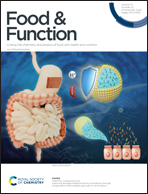Senegalia macrostachya seed polysaccharides attenuate inflammation-induced intestinal epithelial barrier dysfunction in a Caco-2 and RAW264.7 macrophage co-culture model by inhibiting the NF-κB/MLCK pathway†
Abstract
The intestinal barrier dysfunction associated with chronic inflammation is a major health concern. This work aimed to investigate the protective effect and molecular mechanism of Senegalia macrostachya seed polysaccharide fraction (SMSP2) on inflammation-induced barrier dysfunction using Caco-2 cells and RAW264.7 macrophage co-culture model. The results showed that LPS stimulation of the basolateral RAW264.7 compromised the integrity of the apical differentiated Caco-2 cells monolayer, resulting in decreased transepithelial electrical resistance (TER) and increased inflammatory markers. SMSP2 apical treatment maintained a higher TER value and reduced the epithelial permeability to lucifer yellow (LY) dye. In addition, the SMSP2 group showed a significant decrease in the mRNA level of inflammatory factors such as inducible nitric oxide synthase (iNOS), cyclooxygenase 2 (COX-2), interleukin (IL)-8, and tumor necrosis factor-α (TNF-α) in the Caco-2 monolayer compared to the LPS group. Moreover, SMSP2 increased the expression of the tight junctions (TJ) zonula occludens (ZO-1), occludin, and claudin-1 at the mRNA and protein levels. Furthermore, the immunofluorescence assay showed that SMSP2 ameliorated the overall distribution of the TJ proteins in the Caco-2 monolayer. SMSP2 application also resulted in the downregulation of the nuclear factor kappa-B (NF-κB) phosphorylation and the myosin light chain kinase (MLCK) expression, which implies that SMSP2 preserved the monolayer integrity from the inflammation-induced barrier disruption through the inhibition of the NF-kB-mediated MLCK signaling pathway activation. Senegalia macrostachya seeds could therefore be a promising functional food that could be used to improve intestinal barrier function.



 Please wait while we load your content...
Please wait while we load your content...